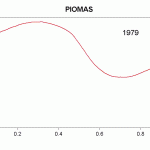Arctic Sea Ice Loss
For the last 25 years or so there has been a decrease in the amount of ice that remains on the surface of the Arctic Ocean every summer. This is a trend that can be attributed to global warming, which in turn, can be attributed to the steady release of previously fossilized Carbon to the atmosphere by the burning of coal, oil, and natural gas. But over the last few years, this decrease in ice has been much more dramatic. The trend has steepened. The formation and melting of ice has to do with air and water temperatures. This in turn can be affected by how much ice there is, because ice…
You all know that the Arctic Ice melts more each summer than ever before. In a few years, the Arctic will be ice free during the summer. The rate of annual melting is greater than expected even just a few years ago. Please note that the increasing melt of Arctic sea ice does not bode well for the associated Greenland Ice Sheet which is also showing signs of melting at a higher rate than expected. The melting of Arctic sea ice has a number of important environmental implications, but the melting of the Greenland Glacier has that plus more; it will contribute significantly to sea level rise…
